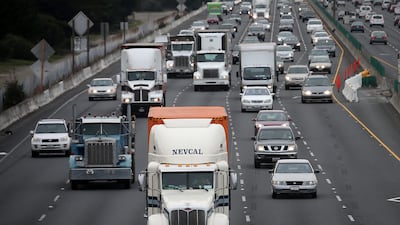A supply chain crisis crippling US ports has been described as a “powerful opportunity” to introduce autonomous trucks to the country’s motorways.
Backlogs of thousands of containers are waiting to be offloaded from cargo ships at Los Angeles, Long Beach, New York and Savannah, Georgia.
Ports are overwhelmed because there are not enough lorry drivers to move the freight.
Now, the man who laid the groundwork for regulating autonomous technology under Barack Obama's administration says self-driving trucks are the answer.
Former US secretary of transportation Anthony Foxx said autonomous vehicles could make faster gains on the backlogs burdening ports and causing shortages of everything from Apple chips to potatoes.
The US has a record-high shortage of about 80,000 lorry drivers, data from the American Trucking Associations shows, as reported by CNN last month.
Mr Foxx, outgoing chief policy officer at ride-hailing company Lyft, said the “easiest, fastest integration of autonomous vehicles” is on long-range trips over major roads that “are not stop-go situations”.
“Trucks can run far, far longer using technology than they can with you or [me] driving, because you and I need to rest,” Mr Foxx told The National before a trip to the UAE for Hypermotion, a future of mobility conference being held on the sidelines of Dubai Expo 2020 from Tuesday to Thursday.
He said the federal government has not been bold enough on autonomous transportation, instead leaving it up to the 50 states to regulate and introduce driverless technology.
This decentralised approach has slowed progress, compared with countries such as the UAE, France and Germany, which make national decisions and move forward.
“The US needs to work on its pipeline, so that we're able to move much faster,” Mr Foxx said. ”The rate of transformation in the sector is moving so much faster than our ability to decide.”
On a different crisis, climate change, Mr Foxx said Joe Biden administration’s infrastructure package has the teeth to spur Americans’ transition to electric vehicles, which would be a critical change as transport makes up the bulk of US emissions.
The $1 trillion bipartisan infrastructure bill has $7.5 billion set aside for charging network investment over a five-year period, with a portion set aside for low-income and rural areas.
“If this infrastructure bill passes, which I believe it will, we’ll have charging networks across the country,” he said. “And that will settle the nerves of so many people who I think have range anxiety about converting to electric vehicles.”
Mr Foxx said he has concern over whether, in determining where to allocate resources, there may be “algorithmic bias” that would undermine the infrastructure bill’s aims to provide EV infrastructure to Americans regardless of income levels.
If the US automates decision-making on where to put charging stations, marginalised communities could be left out because of insufficient or biased data, which would slow down progress on electrification.
Life after the pandemic is a chance for cities to change, said Mr Foxx, who was mayor of Charlotte, North Carolina, from 2009 to 2013.
“We're going to get back-to-basic kinds of transportation, like cycling and walking, as a primary form of transportation,” he said, calling it an opportunity to reduce traffic and give people a healthier alternative to sitting in a car.
He expects more US cities to replace on-street parking with bike lanes.
And while Mr Foxx once predicted driverless passenger cars by 2021, he now says he thinks they will continue to be phased in over the next decade. Already, lane-assisted driving and autonomous parallel parking come standard on many makes and models.
The transition is slow, he said, but it’s happening.


